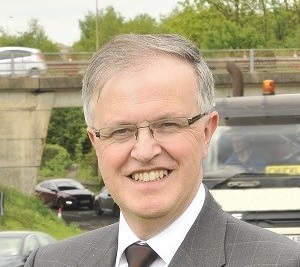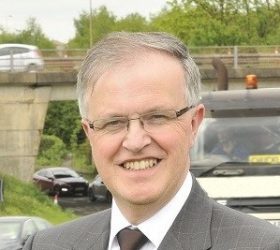Logistics UK, the business group representing more than 18,000 members charged with keeping the UK stocked with all that it needs, is urging the government to maintain the freeze on fuel duty, ahead of this week’s Budget. As David Wells, the organisation’s chief executive explains, any duty rise would have a severe impact on the industry’s ability to meet the government’s decarbonisation targets.
 “With our industry’s revenues still returning to normal after the economic shut down, and logistics businesses already operating on incredibly narrow margins, there is simply not the cash available to fund investment in new technologies as well as paying any additional charge on fuel,” he says. “At present, diesel is one of the single biggest running cost in operating a large fleet of HGVs: our own research indicates it accounts for more than 30% of an HGV’s operating cost and is a commodity which our members simply cannot do without. Any duty rise would do nothing to help our sector switch to new, alternatively fuelled vehicles, and would simply slow the industry’s rate of recovery at a time when logistics businesses are already under intense financial pressure.“Throughout the pandemic, logistics businesses have kept the country stocked with all the goods needed. An increase in fuel duty would directly impact those companies at a time when they are starting to get back on their feet and starting to plan for a cleaner, greener future.”
“With our industry’s revenues still returning to normal after the economic shut down, and logistics businesses already operating on incredibly narrow margins, there is simply not the cash available to fund investment in new technologies as well as paying any additional charge on fuel,” he says. “At present, diesel is one of the single biggest running cost in operating a large fleet of HGVs: our own research indicates it accounts for more than 30% of an HGV’s operating cost and is a commodity which our members simply cannot do without. Any duty rise would do nothing to help our sector switch to new, alternatively fuelled vehicles, and would simply slow the industry’s rate of recovery at a time when logistics businesses are already under intense financial pressure.“Throughout the pandemic, logistics businesses have kept the country stocked with all the goods needed. An increase in fuel duty would directly impact those companies at a time when they are starting to get back on their feet and starting to plan for a cleaner, greener future.”
Logistics UK has been calling for a freeze on all fuel duty until diesel trucks are phased out in 2040, to give businesses time to plan and make the necessary investment in alternatively fuelled vehicles.
“The logistics sector is committed to a net zero future, but to achieve this, needs a stable income stream to make the investments needed in vehicles and infrastructure. A fuel duty hike would do nothing to help our sector on the road to recovery and would make it even harder for our members to achieve their Net Zero ambitions. It would be nothing more than a direct tax on our sector’s ambitions to achieve Net Zero.”


.gif?rand=9916)










